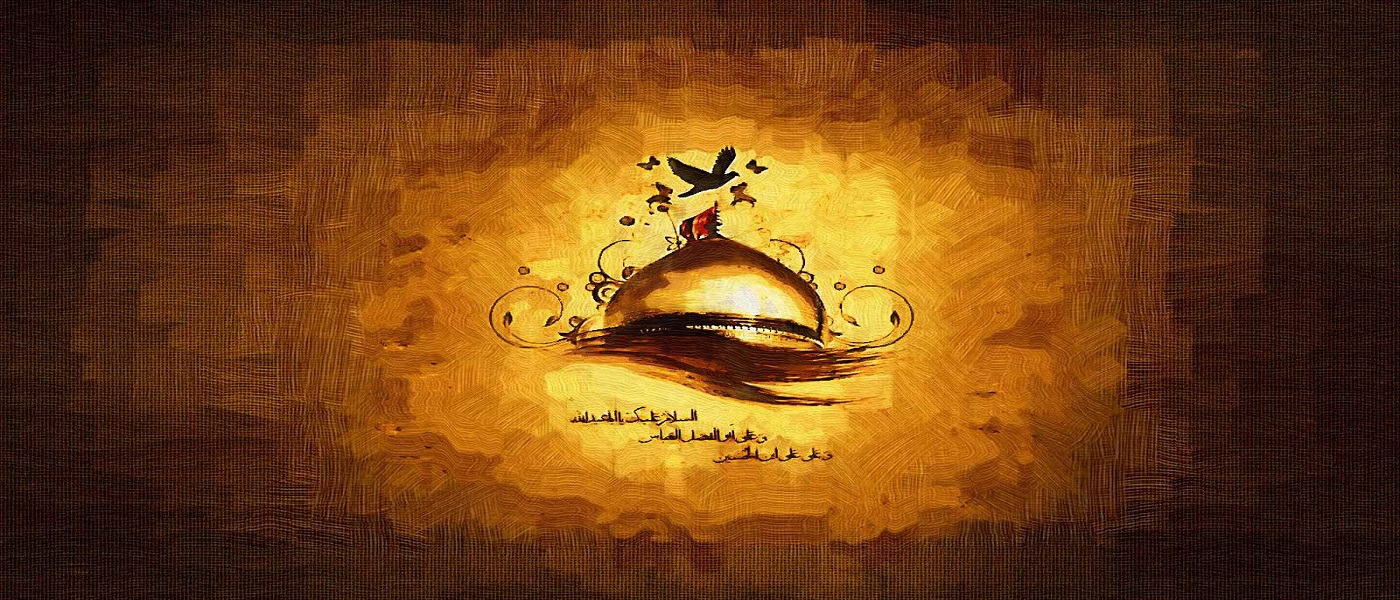

Imam Hussain (AS), the Embodiment of a Universal Moral Law
“Imam Hussain is the leader of humanity” Rabindranath Tagore
The event of Karbala and its moral aspect
People have looked into the movement of Imam Hussain (AS) from different aspects throughout the history of Islam. Some see it as a historical trajectory, where the teachings of Islam were distorted and violated by the tyrant caliph of the time, Yazid, thus Imam Hussain’s movement as a revolutionary act and sacrifice to revive true Islam.
To some others, yet, the most important lesson we can learn from the event of Karbala is its moral or ethical dimension. As Imam Hussain (AS) himself puts: “I seek to enjoin what is good and forbid what is evil and follow the traditions of my grandfather (Prophet Muhammad (PBUH&HP)) and my father (Imam Ali (AS))” [1].
Golden Rule
One of the moral principles that Imam Hussain (AS)’s movement represents and emphasizes is the Golden rule. Based on this rule you should treat others the way you would like to be treated by them: “Do unto others as you would have them do unto you” [2].
Although it is often said that the term ‘Golden Rule’ first started to be used in the 17th or 18th century [3], we can also find it much earlier in the words and acts of Imam Ali (AS) and the other infallible Imams (AS). Imam Ali (AS) tells his son Imam Hassan (AS) in his last will that: “like for others whatever you like for yourself, and whatever you dislike happening to you, spare others from such happenings” [4].
Imam Hussain (AS) also advises people (as a general rule and a decent way of life): “If you do not believe in any religion, at least be free-spirited and honest in your actions” [5].
Golden Rule as a Universal Moral Law
A newer version of the Golden rule also says: “act only in accordance with that maxim through which you can at the same time will that it should become a universal law” [6].
So, for an action to be considered morally good, you should ask yourself whether you could always reason or defend it as a universal law. In other words, to be a good person, you must be good for goodness’ sake, no matter what.
Now let’s see how this ethical value was manifested in Imam Hussain (AS)’s conduct.
Imam Hussain (AS), a Perfect Role Model for Humanity
A question anyone might ask after reading about the event of Karbala is ‘why didn’t Imam Hussain (AS) take an oath of allegiance to Yazid to save his life? Why did he choose to be martyred?’ [i]
One clear answer to this question is that he was the perfect leader (Imam) and role model for the Muslim community. A role model is someone who serves as an example and whose behavior is emulated by other people. To be a good role model you have to observe all your acts so that you set proper examples for others to follow.
Now, if Imam Hussain (AS) had pledged allegiance to Yazid’s tyranny, would he be a good exemplar of resistance against injustice for people? Wouldn’t his compromise then make the tyrant ruler more powerful and dominant?
The answer is obvious. Imam Hussain (AS) chose not to follow the indecent tyrant of his time since he intended to act on that maxim he wished it would become a universal law.
Imam Hussain (AS) Would Always Do the Right Thing
On the other hand, some people criticize Imam Hussain (AS)’s decision, saying he could have pledged allegiance to Yazid while at the same time trying to fight him and his injustice over time.
This would also contradict Imam Hussain (AS)’s maxim and is paradoxical, too. In fact, Yazid’s deviations from true Islam and the moral norms were so many that Imam Hussain (AS) could not turn a blind eye to them.
Imam Hussain (AS) did not want to compromise with those so-called Muslims whose behavior and actions had nothing to do with Islam. Instead, he chose to do the right thing, which any free-spirited, wise and virtuous man would do. And with his movement, he invited us all to do the same and follow in his footsteps.
The End Does Not Justify the Means for Imam Hussain (AS)
The other ethical lesson we learn from Imam Hussain (AS) is that he never disregarded human values on his way to achieve his purpose. And he always advised his followers to choose the right way in life. For him, the end did not justify the means. What mattered to him more than anything else was the values not the victory in its apparent sense.
As Imam Ali (AS) says: “The victory achieved through sins is not, in fact, a victory, the one who dominates with the help of evil is defeated” [8].
It is due to this ethical principle that Muslim ibn Aqil did not kill his enemy, Ubayd Allah ibn Ziyad, before the event of Karbala (before the enemy declared war against them), when he had every chance of doing so in his friend’s house.
He did not kill him because the Holy Prophet (PBUH) forbade any guile: “Verily, Islam became an obstruction of deceit and an obstacle of trickery” [9]. Imam Hussain (AS) and his companions were seeking to revive the teachings of Prophet Muhammad (AS). So, killing even the most wicked person on earth through deceit, and before he has shown an act of hostility against you, is not compatible with Islamic teachings.
In another account from the event of Karbala, Zuhayr, one of Imam Hussain (AS)’s companions, recommended fighting the enemy when they were fewer in number and so easier to defeat. But Imam Hussain (AS) replied he did not intend to start a war; [he would rather defend if a war was imposed on him].
Imam Hussain (AS) Was Martyred to Preserve Human Dignity
The examples mentioned above manifestly show the behavior of a great role model. Imam Hussain (AS) only wanted to restore what was right, the true teachings of Islam which had been distorted by the tyrant ruler of the time. He tried to preserve human dignity and values.
He could have saved his life as well as that of his family’s and companions’ by accepting Yazid’s allegiance. But this would have been at the cost of ruining their dignity and living a life humiliation. Never would he put up with such disgrace.
So Imam Hussain (AS) made the most of every opportunity to invite people to the righteousness and prevent bloodshed. However, when he was left with two options, humiliation or death, and war was being forced upon him, he chose martyrdom and bravely fought against injustice.
Notes:
[i] In one of his sermons to people of Kufa, Imam Hussain (AS) said: “Beware! Now this illegitimate son of the illegitimate father (Ubaydullah bin Ziyad) has stationed me between unsheathing the swords or then bear the humiliation, and far be it that we accept humiliation” [7].
Reference:
- Biharul Anwar, Vol 44, p. 329
- Who is Hussain
- Harry J Gensler, Ethics, and the Golden Rule, p. 184
- Imam Hussain (AS)
- Bihar al-Anwar, vol 45, p. 51
- Hussain, Justice
- Imam Hussain (AS)
- Allamah Sharif Razi, Nahj al-Balagha, Saying 327
- Tahdhib al-Ahkam, vol. 10, p. 214; Al-Kafi, vol. 7, p. 375
Share This Article

Backbiting General introduction
Backbiting is highly forbidden in Islam and is considered as a major sin. By speaking behind the back of others, people might deliberately spoil the dignity of each other, and in Islam, nothing is far more valuable than the honour of a human being. It is narrated from Prophet Muhammad (PBUH & HP) that during the miraculous night journey (Mi’raj) [i] that he (PBUH & HP) had, he (PBUH & HP) passed a group of people in hell who were scratching their own faces with nail. He (PBUH & HP) asked who they were. It was said that, those were the ones who used to backbite and dishonour others [1]. This punishment, besides others, was due to the fact that backbiting destroys the face of others and misrepresents them, hence, the backbiters scratched their faces which caused them to look more monstrous and nasty. Let’s see what Islam’s definition of backbiting, its conditions, types, consequences, etc is.
Meaning of Backbiting in Islam
According to Prophet Muhammad (PBUH & HP), backbiting is to mention and scold someone behind his back which is unpleasant and unkind to him/her [2]. It can be about his/her physical appearance, body, origin, character, deeds, or possessions like clothes, home, children or spouse.
Notice that there is a delicate difference between backbiting and slander. According to Imam Sadiq (AS), backbiting is to reveal something about your Muslim brother which Allah Almighty has concealed. But, revealing which is apparent such as being irascible or hasty is not considered as backbiting. But, slander is to attribute something to someone which is basically wrong [3].
The conditions to consider an act or a saying as backbiting
Not every act or saying about another person is backbiting. Backbiting is:
• If someone talks about the apparent and obvious characteristics of another person, it won’t be backbiting anymore, unless he\she intends to mock and deride that person. Hence, revealing the hidden defects of someone else is considered as backbiting whatever the intention is, but, talking about the obvious defects is considered as backbiting if one aims to reproach;
• When someone reveals the “defects” of someone else, but revealing the “strong points” of another person won’t be backbiting anymore;
• If the deficiency attributed to another person is unpleasant and blamed by everyone else;
• If one aims to dishonour another person by revealing his\her defects;
• And, if there is someone else who listens to or hears what is said about another person. It means that if one reviews someone’s defects by him\herself alone, it is not backbiting.

Backbiting is disapproved in Islam
Backbiting is so denounced in Islam that it is said: “Whoever dies while he had repented from backbiting, he\she will be the last who enters Heaven. And, whoever dies while have kept on backbiting, he\she will be the first who enters the Hell [4]!
In another narration, backbiting is compared to leprosy disease. It is said that backbiting ruins one’s faith much faster than leprosy disease ruins his\her body [5]. In surat Hujurat it is said: “O you who have faith! ... do not spy on or backbite one another. Will any of you love to eat the flesh of his dead brother? You would hate it. And be wary of Allah ...” (49:12).
Types of Backbiting
Backbiting is “mentioning” someone’s deficiency behind his\her back. Accordingly, the types of backbiting are:
• By words: it is the most common type of backbiting. It means one “speaks” about another person’s defect;
• By writing: if someone writes down the imperfection of someone else such that others can read it, too, the cartoons drawn to mock a personality or using someone’ pet phrase in order to make fun of him\her ;
• By act: if one reveals other person’s defect to someone else by showing or imitating it;
• By indirect words: like saying that “how lucky we are that we don’t have such a stingy partner!”;
• By gesture: like revealing one’s defect by a special movement of hand, head, eyes, etc.
Now that we found out how much backbiting is disapproved in Islam and what it is consists of, we need to find out its consequences, the way to prevent ourselves or others from backbiting, etc. Follow us on the second part of this topic to find the answers.
[i] The Mi’raj refers to the materialistic journey of the prophet Muhammad (PBUH & HP) from Mecca to Jerusalem, and from there, to the skies and back home again. That was during this journey that he (PBUH & HP) saw heaven and hell. For more details see: https://www.islamquest.net/en/archive/fa6152
References:
- Mirza Hussain Nouri, “Mustadrak al-Wasa’il”, vol. 9, p. 119.
- M. Naraqi, “Mi’raj al-Sa’sah”, p. 447.
- Shaykh al-Kolayni, “al-Kafi”, vol. 2, No. 7.
- Mulla M. Faydh Kashani, “Al-Mahajjat al-Baydha' ”, vol. 5, p.252.
- Shaykh al-Kolayni, “al-Kafi”, vol. 2, No. 1.
Read More

Rhazes The Old Physician The Modern Doctor
“Put a piece of meat in various parts of town and see in which place it will get rotten more slowly, that would be the proper place for a hospital.” That was the extraordinarily wise and innovative advice of a famous Iranian physician, who at that time lived in Baghdad, to the people who were in search of the most suitable place for building a hospital.This great physician is no one other than Muhammad Ibn Zakariya Razi, also known as Ar-Razi or Rhazes among European scholars, who for the first time in the history of medicine and chemistry, discovered a chemical substance, which served a great deal to these fields, called “alcohol.”
Rhazes 's Life
He was born in 865 A.D in the city of Rey, located in Iran. Though his father tried so hard to make him follow his occupation which was gold smithery, he finally pursued his interest which was alchemy and chemistry at that time.
Having spent many years of his life as an alchemist, he eventually found out that the only field worth learning and working in, was medicine. Moreover, as Al-Birooni [1] claimed, he lost his eyesight when he was occupied in alchemy, and finding a cure for this disability became his motive in turning his direction to medicine.
To learn medicine thoroughly, he left his hometown for Baghdad where the most advanced hospitals were located. He studied and practiced medicine at the local hospital. After spending many years in Baghdad and gaining experience, he moved back to his beloved hometown, Rey.
There, he became the head of its local hospital. He is known to have been the first person who introduced the method of teaching medicine in its modern form used today in our hospitals. As compassionate and devoted as he was, he never stopped curing sick people, rich or poor, and teaching medicine to the students of any background.
He died on the 15th of October in 925 A.D where he was born and spent most of his life, in the city of Rey.
Rhazes's Discoveries
According to the Encyclopedia Britannica [2], he was the first physician who differentiated between measles and smallpox. Besides he is considered to be the father of pediatrics and a pioneer in ophthalmology- the study and treatment of eye disorders and diseases.
He also believed in treatment with proper diet rather than prescribing medicines to his patients. The translation of his most important works in medicine such as “Al-Hawi” [3] and “Al-Mansuri” [4] has long been taught in medical universities of European countries such as Germany and France.
He was a devoted Muslim who was profoundly influenced by the teachings of Islam. His idea about the importance of seeking knowledge with one’s full capacity is in close association with the idea of Prophet Muhammad (PBUH) when he said: “those who peruse knowledge, will be perused by heaven” [4] & [5].
The great Iranian Muslim physician, chemist, and philosopher, Muhammad Ibn Zakariya Razi, with his everlasting contributions in medicine and chemistry, did not remain limited to his time or geographical boundaries. He was the great physician of his time and is considered a respected and influential doctor of our age in all parts of the world.
Reference:
- "ar-Razi." Encyclopedia Britannica. Encyclopedia Britannica Online.Jun. 2014
- ibid.
- Mahmud Najm Abadi, The History of Medicine in Iran and World of Islam.
- Mottaqi Hindi, Kanz al-Aamal.
- Muhammad, Mizan al Hekmah, vol. IV, Qum: Dar al-Hadith Institution, 1386. p.398.
Read More

